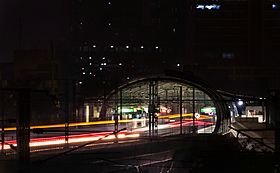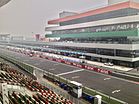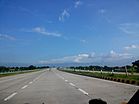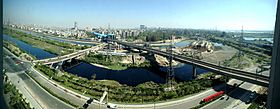Gautam Buddha Nagar district facts for kids
Quick facts for kids
Gautam Buddha Nagar district
|
|
|---|---|
|
From Top (left to right): Noida Metro, Noida–Greater Noida Expressway, Noida Skyline, Buddh International Circuit, Yamuna Expressway, Panoramic view of Noida City
|
|
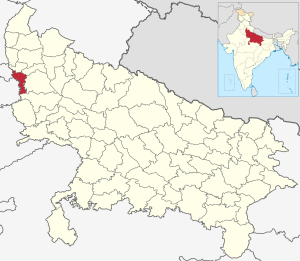
Location of Gautam Buddha Nagar district in Uttar Pradesh
|
|
| Country | |
| State | Uttar Pradesh |
| Division | Meerut |
| Established | 6 September 1997 |
| Headquarters | Noida |
| Tehsils |
|
| Area | |
| • Total | 1,442 km2 (557 sq mi) |
| Population
(2011)
|
|
| • Total | 1,648,115 |
| • Density | 1,142.9/km2 (2,960.2/sq mi) |
| Demographics | |
| • Literacy | 68.14% |
| • Sex ratio | 851 ♀/ 1000 ♂ |
| Time zone | UTC+05:30 (IST) |
| Vehicle registration | UP-16 |
| Major highways | NH-24 DND Flyway Noida–Greater Noida Expressway Yamuna Expressway |
Gautam Buddha Nagar is a district in Uttar Pradesh, India. It is named after Gautama Buddha, a very important spiritual teacher. This district is part of the Delhi NCR, which is a large urban area around India's capital city. The district is split into three main parts called sub-divisions or Tehsils: Noida, Dadri, and Jewar. Greater Noida is the main administrative center for the district. Other important towns here include Noida, Dadri, Jewar, and Dankaur.
Contents
History of Gautam Buddha Nagar
Gautam Buddha Nagar district was created on September 6, 1997. It was formed by taking parts from two other districts: Ghaziabad and Bulandshahr district. The areas of Dadri and Bisrakh came from Ghaziabad. Dankaur and Jewar came from Bulandshahr.
Role in India's Freedom Struggle
People from this area played a big part in India's fight for independence. Famous freedom fighters like Bhagat Singh, Rajguru, Sukhdev, and Chandra Shekhar Azad used Nalgadha village (now in Sector-145, Noida) as a hiding spot. This village is located on the Noida-Greater Noida Expressway. They even planned the 1929 bomb attack on the Central Legislative Assembly (which is now the Parliament House) from Nalgadha village.
Ancient Connections
The land of this district has ties to ancient Indian stories. Bisrakh village in Greater Noida is believed to be the birthplace of Vishrava Rishi. He was the father of Ravana, a key character in the epic Ramayana. In the Mahabharata epic, Dankaur was the ashram (school) of Dronacharya. This is where the Kauravas and Pandavas, the main characters, received their training.
People of Gautam Buddha Nagar
| Historical population | ||
|---|---|---|
| Year | Pop. | ±% p.a. |
| 1901 | 204,084 | — |
| 1911 | 201,453 | −0.13% |
| 1921 | 194,556 | −0.35% |
| 1931 | 207,635 | +0.65% |
| 1941 | 242,431 | +1.56% |
| 1951 | 281,621 | +1.51% |
| 1961 | 331,688 | +1.65% |
| 1971 | 406,847 | +2.06% |
| 1981 | 514,037 | +2.37% |
| 1991 | 770,367 | +4.13% |
| 2001 | 1,105,292 | +3.68% |
| 2011 | 1,648,115 | +4.08% |
| source: | ||
According to the 2011 census of India, Gautam Buddha Nagar had a population of 1,648,115 people. This means it was ranked 294th out of 640 districts in India for its population size. The district has a population density of about 1161 people per square kilometer.
Literacy and Gender Ratio
The female literacy rate in Gautam Buddha Nagar is 72.78%. This is much higher than the national average for India, which is 65.46%. Literacy means the ability to read and write. About 13.11% of the population belongs to Scheduled Castes. The sex ratio in the district is 851 females for every 1000 males.
Religions and Languages
| Religion in Gautam Buddha Nagar district (2011) | ||||
|---|---|---|---|---|
| Religion | Percent | |||
| Hinduism | 84.58% | |||
| Islam | 13.08% | |||
| Other or not stated | 2.04% | |||
| Distribution of religions | ||||
Most people in Gautam Buddha Nagar follow Hinduism. A significant number of people also follow Islam. Other religions are also present.
The most common language spoken in the district is Hindi. Other languages like Bengali, Urdu, Punjabi, and Bhojpuri are also spoken by some residents.
How Gautam Buddha Nagar is Managed
General Administration
The Gautam Buddha Nagar district is led by a District Magistrate (DM). This person is usually an officer from the Indian Administrative Service (IAS). The district is divided into three smaller areas called sub-divisions. Each sub-division has its own leader, called a Sub-Divisional Magistrate (SDM).
| Sr. No | Sub-division | Block(s) | No. of Villages |
|---|---|---|---|
| 1. | Sadar (Noida) | Bisrakh and Dankaur | |
| 2. | Dadri | Dadri | |
| 3. | Jewar | Jewar |
Police Administration
On January 14, 2020, the Government of Uttar Pradesh made Gautam Buddha Nagar district a Police Commissionerate. This means it has a special police system, similar to big cities. It was one of the first two such Commissionerates in Uttar Pradesh.
The police force in Gautam Buddha Nagar is led by a police Commissioner. This officer is of a high rank, like an Inspector-General (IG). They are helped by two Additional Commissioners who manage law and order, and crime. These top officers are supported by many other police officials, including Deputy Commissioners and Assistant Commissioners.
The district's police operations are divided into three main zones: Noida, Central Noida, and Greater Noida. These zones have a total of 29 police stations. As of January 14, 2020, there were 3,869 police personnel working in Gautam Buddha Nagar.
Politics in Gautam Buddha Nagar
Gautam Buddha Nagar district has three assembly seats. These are areas from which people are elected to the state assembly. The seats are Noida, Dadri, and Jewar. These three seats, along with two others from the Bulandshahr district, form the Gautam Buddha Nagar Lok Sabha constituency. A Lok Sabha constituency is an area from which a person is elected to the national parliament.
Villages
- Mahvalipur
Places to Visit
- Buddh International Circuit
- The Great India Place
- Worlds of Wonder
- DLF Mall of India
- Gautam Buddha University
- Rashtriya Dalit Prerna Sthal and Green Garden
See also
 In Spanish: Distrito de Gautam Buddha Nagar para niños
In Spanish: Distrito de Gautam Buddha Nagar para niños
 | Toni Morrison |
 | Barack Obama |
 | Martin Luther King Jr. |
 | Ralph Bunche |


